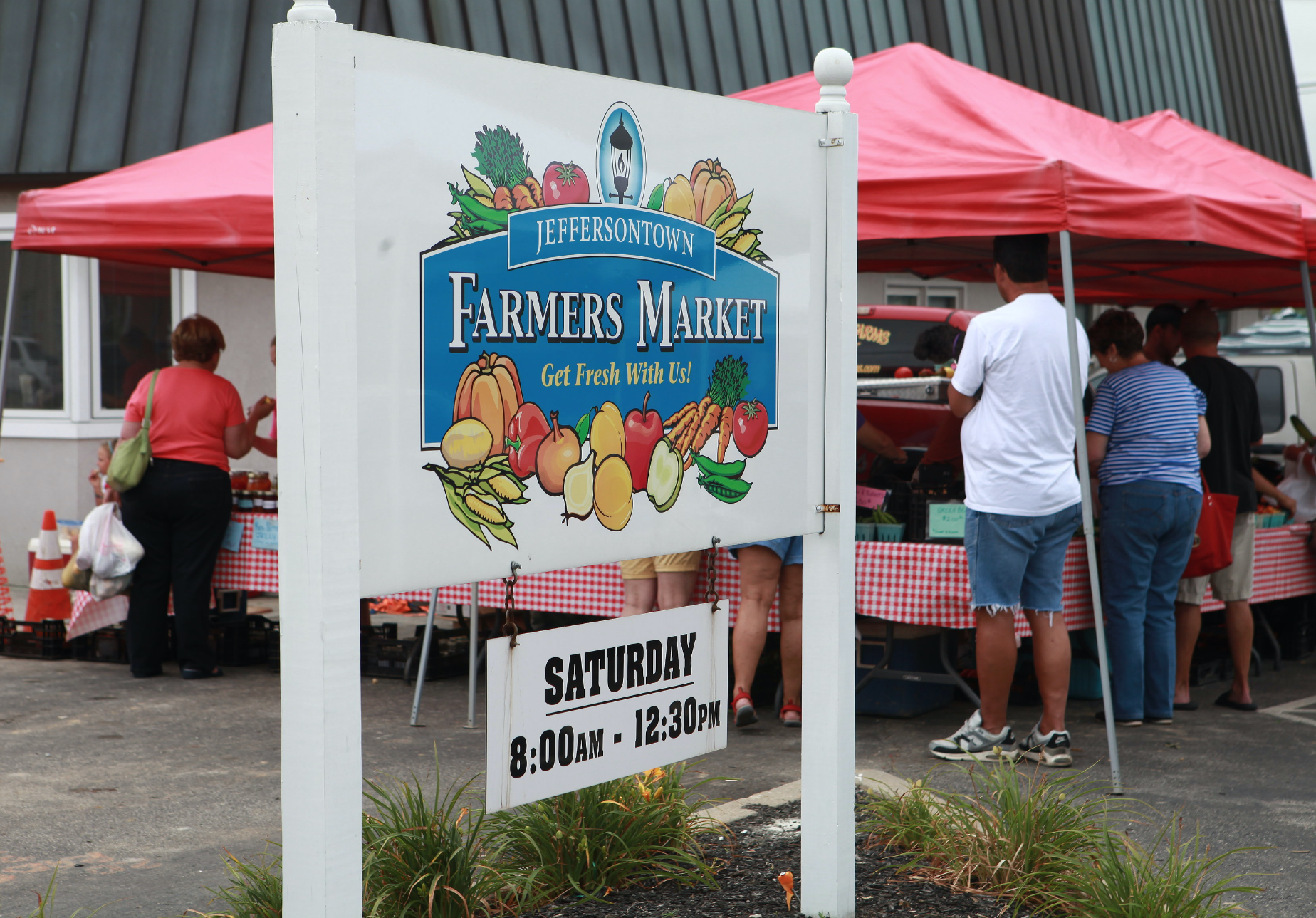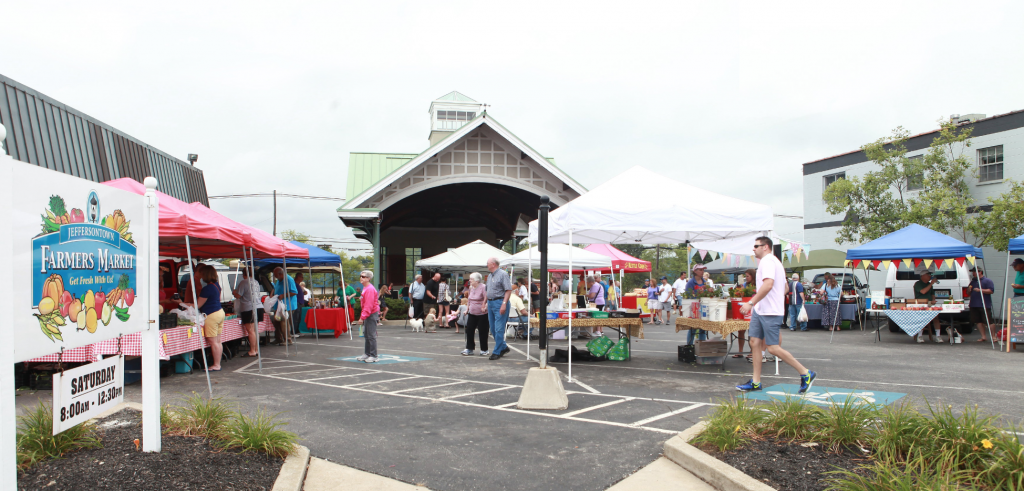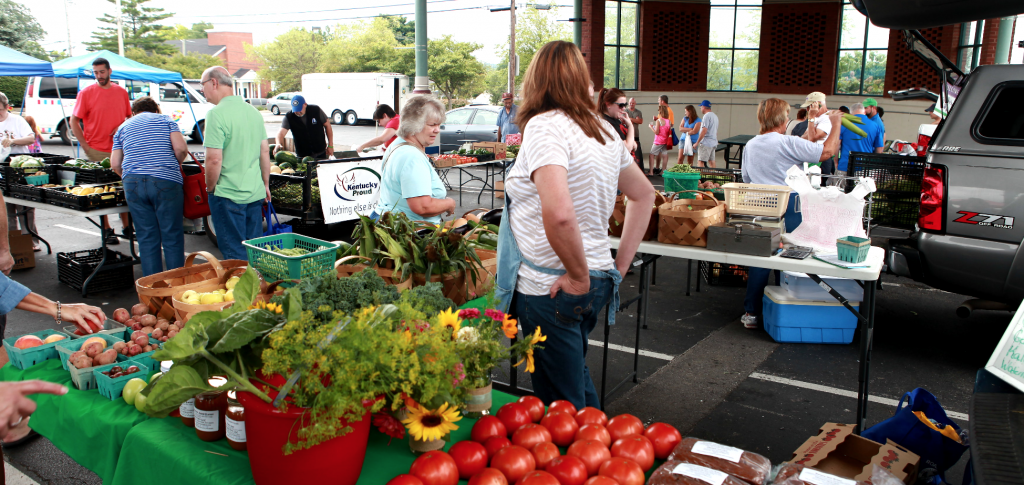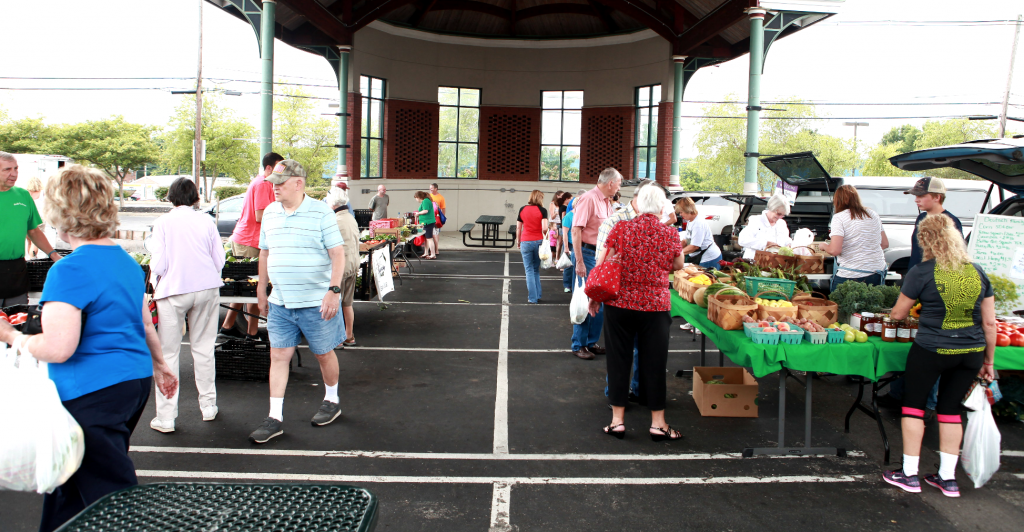Writer / Carrie Vittitoe
Farmers’ markets have grown in popularity over the last several years as more people have become interested in knowing exactly where their food comes from. If you stop by the pavilion on Watterson Trail in the heart of the city on a Saturday morning between May and October, you’ll see vendors selling everything from pottery to cucumbers to sausage sandwiches.
Some of the regular summer Jeffersontown vendors include Branham Farms, which will be selling all cuts of pastured beef this summer. They also sell pastured chicken and chicken eggs. Goodin View Farms of Lebanon, Kentucky will celebrate 17 years selling at the Jeffersontown summer market in 2018 and offers a wide variety of vegetables, as well as strawberries, blueberries, and watermelons. Connie Moeller owns GardenGeek and regularly brings plant starts and cut flowers to the market.
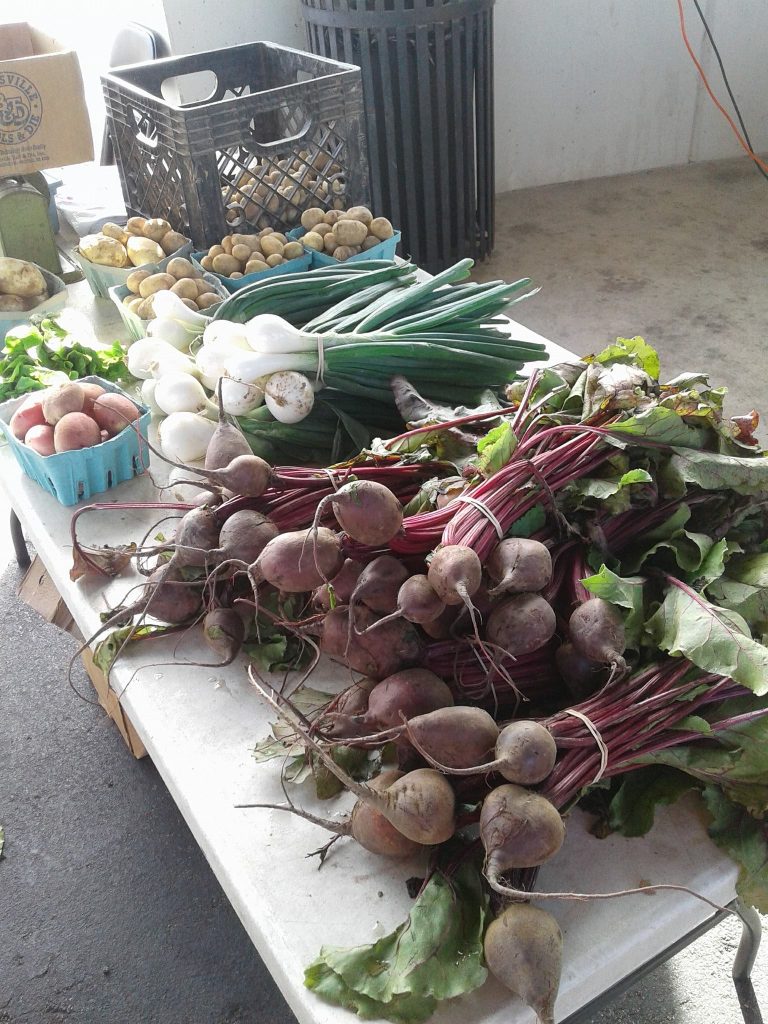 But Jeffersontown farmers’ market offers something special to local shoppers because it isn’t just open during the summer months. From November through March, the market sets up at Jeffersontown Christian Church on Taylorsville Road to ensure that shoppers can still acquire their beloved local goods even when the growing season is officially over. During these months, vendors who sell at the summer Westport Road market join their Jeffersontown colleagues.
But Jeffersontown farmers’ market offers something special to local shoppers because it isn’t just open during the summer months. From November through March, the market sets up at Jeffersontown Christian Church on Taylorsville Road to ensure that shoppers can still acquire their beloved local goods even when the growing season is officially over. During these months, vendors who sell at the summer Westport Road market join their Jeffersontown colleagues.
The City of Jeffersontown officially runs the Jeffersontown market, but a market committee appointed by the mayor does much of the communication with vendors and keeping the Facebook page up-to-date for the public. Roni Reed (of Hope Grown Gardens) is the market ambassador who serves as the liaison between the city and vendors, and she works alongside Connie Moeller (of GardenGeek) and Don Goodin (of Goodin View Farms) on the committee. Matt Meunier, Jeffersontown’s director of community development and assistant to the mayor, serves as the market manager.
One of the most common trends among vendors is how many do their farmers’ market work in addition to other full-time jobs. For them, participating in the market is a real labor of love.
Gary and Laura Hughes are the owners of Gangsta Dog, a Kentucky Proud company that produces handmade dog treats using dog-safe ingredients and 30 different recipes. The idea of Gangsta Dog came to them while having drinks at a restaurant and led to them doing research and experimenting with recipes to see what dogs liked. Gary says he friended people on Facebook who had dogs and sent them free biscuits to test. “I sent them all over the country,” he says. “If any dog didn’t like them, we reworked the recipe.”
The Hughes also test their products themselves to ensure they are high quality. “We eat a biscuit from every batch to make sure,” Gary says. He jokingly says they also do animal testing because they give their own dogs the treats. The couple uses natural products, not just flavorings, in the treats. “If it says bacon, we cook it up and put bacon in there,” Laura adds.
Marcy Mason is the baker behind Marcy Mae’s Petite Cakes. She, too, works a full-time banking job in addition to her beloved side gig. She makes 13 different kinds of cakes, but her best seller is a lemon cake dipped in white chocolate. Her creations come in two different sizes: 1.5 inch and 2.0 inches.
Before starting her small business, she didn’t realize how much preparation time goes into production. She rents commercial kitchen space downtown and spends at least three or four afternoons or evenings getting her cakes ready for the market. Her first step is baking the cakes, but then she uses special cutters to get them to the correct sizes. Preparing and dipping the cakes is another step, followed by wrapping and boxing and then loading them for transport. It takes a lot of dedication to make a farmers’ market business happen.
“You gotta love what you do,” Mason says.
Vendors have different reasons why they’ve decided to grow or make products and sell them. For Gina Reigel, the owner of Zenchantment, her young son motivates her to participate in the market. “All money from this [small business] goes into a trust for him,” Gina says. Jacob has Down Syndrome, and his mother wants to ensure that he will be well cared for in the future.
During the day, Gina works on the broker floor of a local energy trading company, but on Saturdays, you will find her selling handmade jewelry and charms, wall hangings, hand-painted shirts, and oil blends. In addition to being inspired by her son, Gina finds inspiration in Native American culture and art. She says her great-grandmother was full-blooded Cherokee, so she finds herself drawn to making items that are influenced by Native American life.
For some of the vendors, their farmers’ market product has become their full-time employment. Bland Matthews is the owner of Berserker Brew. He says he sold his first pound of coffee in September 2017 and is now selling online in 16 different states. He is an athlete and says, “I wished there was a coffee I could drink black without adding fat and sugar.” Although he had worked for a big company for most of his career, when life presented him with an opportunity to be his own boss, he took it.
He began doing extensive research into coffee at his kitchen table and eventually found an organic bean company in Massachusetts that could be his supplier. He got some beans and says, “I went science lab on it.” He tinkered around with putting different types of beans together to create blends. One of his products, called First Attack, is made of four different beans.
While some vendors have been participating in farmers’ markets for just a short time, others come from a long line of farmers.
Tommee Clark is the owner of Sunny Acres Farm and is a third-generation farmer. Her dad and grandparents bought the farm that is located in southeastern Jefferson County in 1949. In addition to selling eggs, pork chops, and sausage, she also sells value-added products like honey, jams, and jellies. She has a special farmers’ market vendors permit to cook items her farm produces, which shoppers seem to like. They can pick up their breakfast from her as well as lunch and dinner items that they will cook later.
Sandi Deutsch of Deutsch Farm in Taylorsville, Kentucky married into the fourth generation family of farmers. “I’ve been married 43 years, and it was going on before that,” she says. She is a regular face at the winter Jeffersontown market and the summer Westport Road market. In addition to vegetables, she brings baked items and jarred goods. Sandi used to sell chickens at the market, but she says she now leaves that up to Jeff Grams, who is a first-generation farmer.
Jeff is the owner of Grams Family Farm in Munfordville, Kentucky. He says he and his wife, Kathleen, were city people who decided they liked living in the country and wanted to raise their own food. In 2017, the farm had 600 meat chickens, 27 head of cattle, and six hogs, and 2018 marks his third selling at the market. The Grams drive nearly 90 minutes to get from their farm to the Louisville markets.
It is clear when speaking to these farmers’ market vendors how excited they are about their products and how strongly they believe in what they do. Although farmers’ market shoppers are usually pretty loyal, knowing the people and the stories behind the products make them even more valuable.


